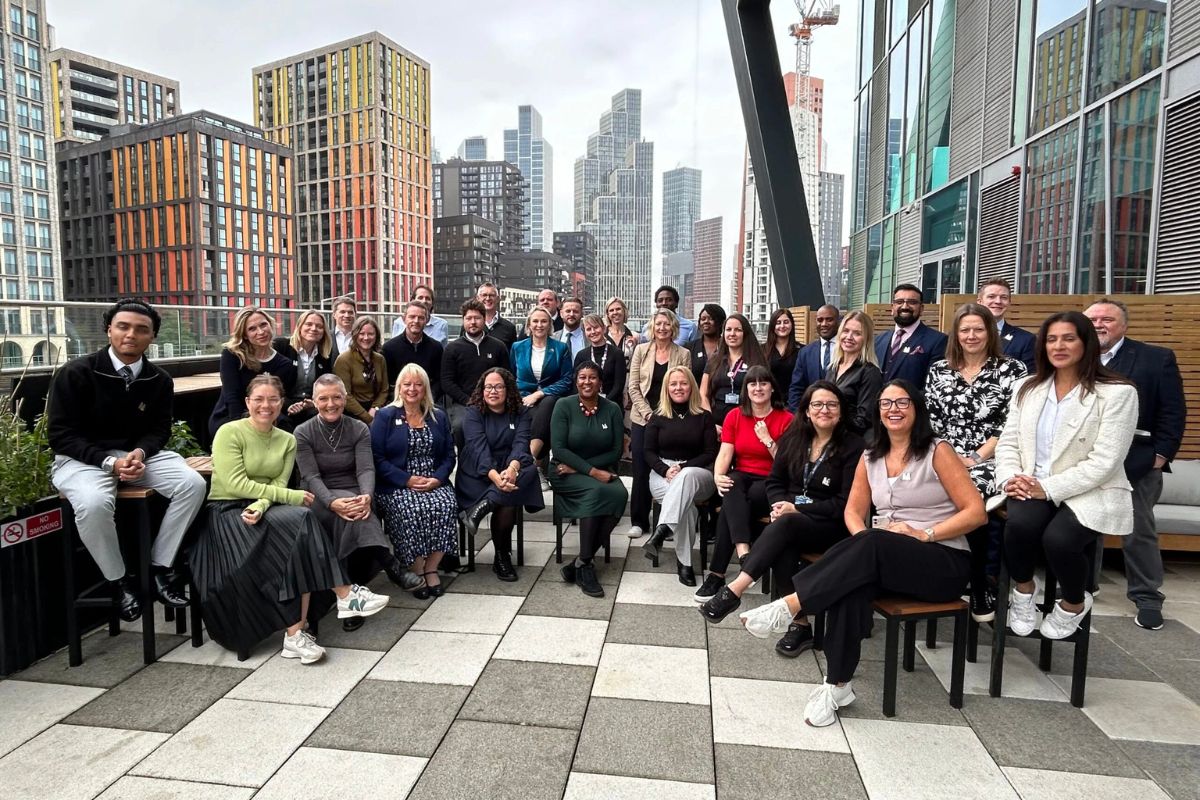Black & South Asian Women in the UK Have to Wait Two Months Longer to Land Their First Job, Despite the Highest Levels of Career Confidence

- Black and South Asian women have higher levels of confidence about their career trajectory than white colleagues, but face barriers to progression due to racism and sexism
- Two thirds of Black and South Asian women at managerial level believe that their ethnicity or gender has impacted their progression into a position of leadership
- Two thirds of Black and South Asian women have felt the need to code-switch at work, while 79% have faced discrimination
- As a result, almost two thirds (62%) of Black and South Asian women report their wellbeing at work has suffered
On average, it takes Black and South Asian women in the UK at least two months longer than their white colleagues to secure their first job after leaving education – research from Totaljobs has revealed.
The research found that after leaving education, it took Black women, on average, 5.1 months to secure their first role, and South Asian women 4.9 months. This is in comparison to 3.4 months for white men and 2.8 months for white women.
An equal path to career progression: an employer’s guide to uplifting Black and South Asian women in the workplace, is a new report from Totaljobs and The Diversity Trust, assessing the career journeys of Black and South Asian women in the UK.
Progression paradox
The research found higher levels of confidence and optimism among Black and South Asian women upon leaving education. Before stepping into the world of work, 66% of Black women and 62% of South Asian women believed they could achieve anything in their future career; compared to just 38% of white women and 46% of white men.
Further into their careers, 64% of Black women and 62% of South Asian women are confident in their career trajectory – compared to 53% of white men and 43% of white women. While these levels are still higher than their white colleagues, it shows that the levels of confidence felt by Black and South Asian women starts to wane when they enter employment; in comparison to the confidence of white colleagues, which increases drastically after they leave education.
Despite high levels of confidence, and the fact that three-fifths (59%) of Black and South Asian women believe their employer supports their ambitions, two thirds of these women at managerial level believe that their ethnicity and/or gender has impacted their progression into a position of leadership. With this, 30% of Black and South Asian women at managerial level felt they had to work harder to reach their position than their colleagues and a fifth feel pressure to act as a role model.
Discrimination and associated pressures
The research also highlights the pressures and discrimination faced by Black and South Asian women as they progress throughout their careers. Two thirds of Black and South Asian women (70% of Black women, 63% of South Asian women) felt the need to “code-switch”[1] at work, i.e feeling the need to change the language they use, appearance, tone of voice, name, and mannerisms.
In addition, four fifths of Black and South Asian women (79%) admit they have faced discrimination in the workplace, with less than a fifth of these women (17%) reporting it.
The research found that many Black and South Asian women felt unable to report incidents of discrimination because they didn’t feel comfortable in doing so (29%), had a lack of confidence in a resolution (25%), felt they would be penalised themselves for reporting it (13%), and did not believe the business would take the report seriously (16%).
Wellbeing
These incidents of code-switching and discrimination at work are taking their toll, with the majority of Black and South Asian women (62%) saying that their wellbeing has suffered at work.
Of those who have struggled with their wellbeing at work, three in ten (29%) Black and South Asian women say have received good levels of support from their employer (defined as paid time off, access to a counsellor, reduced workload or other related actions) and have felt comfortable reaching out (31%). However, one in eight (13%) say they have reached out for support but have not received it.
Over a third (35%) of Black women and 34% of South Asian women are part of an employee-led network; but only 12% of these are funded by their employer. An additional 12% are not endorsed by their organisation and are part of an external network. Over half (55%) believe such groups can help to make the workplace more inclusive.
Jon Wilson, CEO at Totaljobs said: “A person’s career journey should see their confidence building over time, as their employer supports their desire for growth, and ambition for career progression. However, our research shows that for Black and South Asian women, this confidence stagnates because many find themselves in workplaces that are not meeting their needs, whether that’s in the form of unaddressed discrimination, the additional pressures that come with a lack of representation, or simply not feeling comfortable to be themselves.
It’s vital that the actions taken by organisations to create a more diverse and inclusive working culture is embedded in the needs of Black and South Asian women. The findings are indeed sobering, which is why we have worked with The Diversity Trust to identity clear areas of focus for employers. The creation and funding of employee-led networks is one way employers can ensure the voices of Black and South Asian women are heard, while offering a safe space within the organisation where lived experiences can be shared.
Alongside looking internally at actions to create a workplace which is diverse, equitable and inclusive, employers can also consider the role their attraction and recruitment strategies play in opening up opportunity. Our research shows that it takes Black and South Asian women longer to see success when it comes to getting that first job offer. At Totaljobs, innovations such as Equality Boost allow the employers we work with to showcase their career opportunities to underrepresented groups, through an inclusive hiring solution which pinpoints when, where and how to reach more diverse talent pools.”
Advice for employers
Commenting on the findings, Tinashe Verhaeghe, Consultant at The Diversity Trust said: “The findings in this study are significant, highlighting some of the structural and institutional barriers that Black and South Asian women face to succeeding in their chosen career. Despite this, the women we surveyed and spoke to expressed confidence in themselves and a desire for employers to examine their structural and implicit biases for them to have improved chances to succeed and experience less harm in the workplace. There is sufficient evidence of the need for change, the impetus is now on employers and colleagues to act.”
Upon consultation with The Diversity Trust, Totaljobs recommends that employers take the following actions to diversify their hiring processes and foster an inclusive working environment. These recommendations include but are not limited to:
- Introduce measures to mitigate biases and discrimination during the recruitment process
- Provide the right environment that translates the ambition and determination of Black and South Asian women into career success
- Create “safe spaces” for communities, alongside explicit acknowledgment of the existence of racism and sexism in the workplace
- As a business, commit to ongoing education and training to create an environment where discriminatory behaviour is challenged and diversity and inclusion is valued
Further recommendations on attracting and recruiting, adapting company culture, workplace education and allyship, championing career progression, supporting wellbeing and addressing discrimination can also be found in the report.
Further information about Equality Boost can be found by visiting this page
About Totaljobs
Part of the global recruitment technology company StepStone, Totaljobs is a cutting-edge recruitment solutions partner whose goal it is to find the right job for everyone.
Through our consultative approach, we identify the hiring needs within businesses and help clients succeed by offering our support throughout their attraction, hiring and retention processes.
Our ambition is to build a happy and prosperous society by innovating the world of work. Our vision is to help everyone get the job that best suits their life and help employers secure the right people to enable their businesses to thrive, helping everyone prosper.
At our core is innovative tech with a human heart.
About The Diversity Trust CIC
The Diversity Trust CIC is a Community Interest Company established in 2012 in the UK. Our mission is to ‘influence social change to achieve a fairer and safer society’. The Diversity Trust has undertaken large scale auditing, consultancy projects, research, training and strategic projects across the corporate, public, private, voluntary, community and social enterprise sectors across the UK as well as internationally. We are specialists in equity, equality, diversity, and inclusion.
As an equalities-led organisation, our Directors and Associates are members of protected characteristics including minority ethnic communities, LGBT, Disabled and Neurodivergent people. The Diversity Trust supports all marginalized communities in our society and is especially supportive of the LGBT and Trans movement. Our network of consultants brings rich, lived experiences that are critical to understanding the issues of bias and how it helps create structures of institutional and systemic discrimination e.g., racism in our society.
Our clients include individuals, businesses, and organisations across the corporate, public, and social purpose sectors. We have a wealth of knowledge and experience in policy development, project management, research, evaluation, and training. We are able to advise our client, and partner organisations, on employment and management, as well as service design, development and delivery.
For more information about us please visit www.diversitytrust.org.uk
[1]*Harvard Business Review defines code-switching as: “involv[ing] adjusting one’s style of speech, appearance, behaviour, and expression in ways that will optimise the comfort of others in exchange for fair treatment, quality service, and employment opportunities.”











Responses